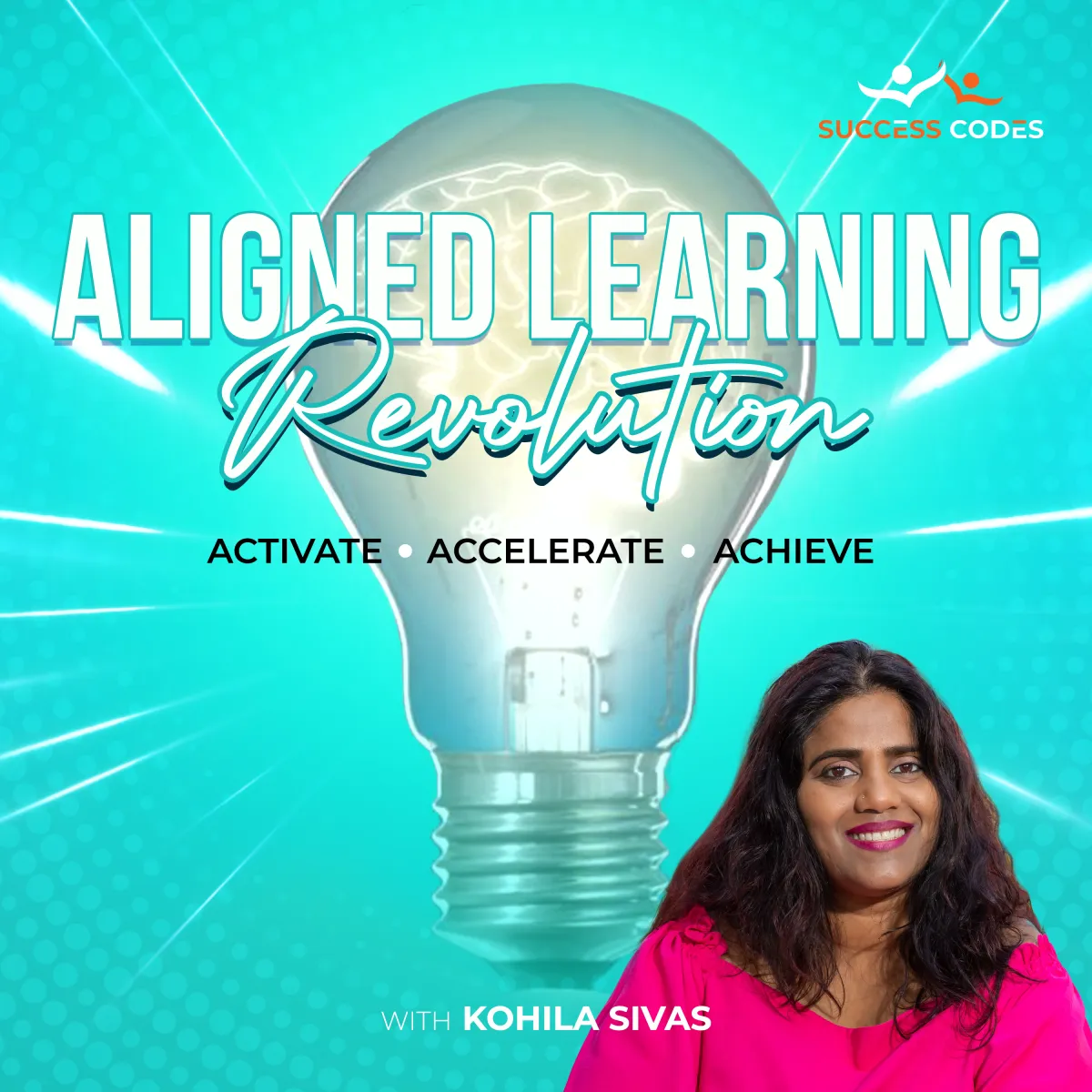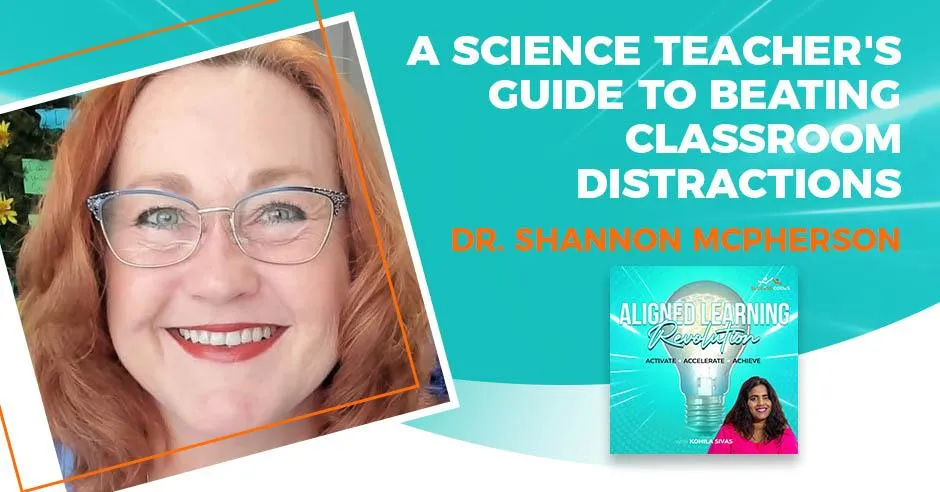
ACTIVATE ACCELERATE ACHIEVE
Traditional education has long served as a foundational pillar in societal progress. Yet, its inclination to prioritize academic success over the holistic development of children remains a predominant concern. As students invest countless hours in classroom learning, more than 90% of the students are struggling to reap its full benefits. This results in unmotivated learners and a sense of disillusionment among parents and educators. This podcast addresses that critical imbalance head-on.
Introducing Aligned Learning Revolution, the podcast that re-envisions student learning for today's rapidly evolving landscape. It serves as a beacon for those seeking to supplement the conventional education model with rich, applicable learning experiences beyond traditional limits. Join a voyage of discovery that elevates the educational dialogue with insights from parents, teachers, and thought leaders who are altering the rules of student engagement and learning efficacy.
The show joins a diverse group of people who express their discontent with the current education system and offer their well-informed opinions on necessary changes. Listen to parents whose children deal with the challenges of a system that seems to be against them and how these families have successfully managed to navigate through standardized education to showcase their children's unique talents and abilities.
Don't let a single discussion pass by. Be part of the solution by listening and contributing.

LISTEN HERE
LATEST BLOGS

A Science Teacher's Guide To Beating Classroom Distractions With Dr. Shannon McPherson
Calling all parents and teachers! Are you struggling to keep students focused in today's tech-filled world? In this episode, we speak with Dr. Shannon W. McPherson, a highly trained and experienced high school science teacher who's witnessing a decline in student focus and motivation. Dr. McPherson shares her experience of implementing mindfulness exercises to bring students to a learning state and discusses the challenges teachers face with large class sizes and limited administrative support. We also explore the role parents play in setting boundaries around phone use and creating a strong foundation for communication at home. Tune in for valuable insights and practical tips to help our children thrive in the classroom!
---
Watch the episode here
Listen to the podcast here
A Science Teacher's Guide To Beating Classroom Distractions With Dr. Shannon McPherson
Lifelong Dedication To Science And Learning
I have the pleasure to speak with Dr. Shannon McPherson, a seasoned high school science teacher with over 26 years of experience and a profound love for education. She's not confined to the high school classroom. She's also nurtured future nurses as an Adjunct Faculty Member in Autonomy and Physiology.
Before shaping the minds of tomorrow, Shannon was a chiropractor, demonstrating early on her dedication to helping others thrive. After volunteering at her son's elementary school, she redirected her path toward education. As a mother, a lover of nature, and a lifelong learner, Shannon embodies the spirit of curiosity and care. Shannon, welcome to our show. How are you doing?
Good, thank you for having me. How are you?
Very good. I want to take you back to when you decided to become a teacher. Why did you become a teacher in the first place?
Becoming A Teacher
When I was looking at college, I didn't have the typical college experience, but when I was looking at going to school to figure out what I wanted to do with my life, I thought I wanted to be a teacher. I had a counselor at that particular college tell me no, I would be a terrible teacher.” This was the late ‘80s or early ‘90s, and it was a different scenario. It was also in the state of Louisiana, and I believed him. “That's what you do for a living, so I'm going to believe you.”

Many years down the road after finishing college and finishing a Chiropractic college and having a practice that was slowly going into the black from the red, I was starting to make a little bit of money, I was spending the bulk of my time at my oldest child's elementary school. To give you an idea of how long that's been, he's an adult now. I spent a lot of time at his school, and I fell in love with the environment. I loved working with the kids. I felt so at home. I went through and got my alternative certification and many years later, here I am.
Thank you for your service. That’s awesome. Now that you're in the school system, you're teaching sciences. You're at the high school level, right, teaching high school sciences?
Yes. Specifically, now, I'm teaching the health sciences, which is the students going into some type of medical field.
Shift In Learning
What do you see as a shift happening in the way that our students are learning?
It's very different. What you would consider to be an upper-level science class is mediocre at best. That's as much as they can handle, even the highest level of students. It is a disservice to what they should be able to do. I don't get the support that I used to be able to get in the schools. I feel like I'm dying a death by a thousand cuts. Every time you turn around, there's something else that has to be done.
“Here, just something else. It'll take you a few more minutes. Just a few more minutes on this, too. Here, do this, too. Here, you need to do this, too.” It's nothing to do with teaching. It's all administrative paperwork. I could spend eight hours a day doing that paperwork alone, not even teaching and not even preparing my students. It's gotten really old. Every year it's worse. There's more and more on my plate.
Tell me about how students respond to science because I know there are a lot of students who don't see the purpose of learning science unless they're in the higher courses and they're thinking of going into a different medical field, but do you feel there's a drop in kids taking these courses?
They're required to take certain courses and I've always taught those specific courses. They didn't have a choice. The ones the last couple of years that I've been teaching, it was more of an elective type of science for them now, but years ago, you have to get them excited. They are not excited to be there. They don't want to be in the room. Chemistry, not so much. They were just not interested. They had to be there, and they had the same attitude about having to be there. They clearly didn't want to be there. You had to work hard, especially the first 6 to 8 weeks, to get their buy-in and to get them willing to even try.
Do they come to the class? They don't like the class? Do they show up? I guess you get attendance.
Yes, they have to have attendance, but I always try to make things fun. Lots of activities, a dog and pony show kind of thing almost. Lots of activities, lots of hands-on, lots of joking around, a lot of having fun. That's part of the job. Part of the beauty of being a teacher is that you can do those things, but if I wasn't doing those things, they were not involved. There's just not a lot of self-wanting to get up and do it. They get up and actually, “I want to learn this. I want to be a part of this.” That was not happening on their own.
You've been a teacher for a while. Do you think it's a shift or was it always like this? Are you seeing a shift?
It's more of a shift. There's a shift and I'm not real sure what brought it on. We have issues nowadays with kids on phones. They want immediate satisfaction very quickly. The brains are formed a little differently now. It’s the iPad generation. You've got the iPhone generation. The technology is now the babysitter. The brains are forming differently. They don't have the same value system. My brother's in radio and he told me that if you don't get your listener interested in the first eight seconds, they will turn you off and that's what's what teaching has turned into.
Also, we apparently have less than a goldfish’s attention spanl. That's what I read somewhere. They all add up, but how do we fix this problem? What happens if this continues?
We're just going to see a steady decline. I'm seeing it right now. As I said, I'm teaching these higher-level kids and It's more of a mediocre standard now versus many years ago when I first started. My own level classes in biology and chemistry at the time were equivalent to the upper-level classes now. What's going to happen is there's going to continue to be a decline.
We're already 26th in the world for education in the US, anyway. That's very sad and it's frustrating because you want to do something about it, but what do we do? Our hands are tied because the government and the administration are not supportive, and we don't have enough time to do the job anymore.
What about the class size? Does that affect how much you can spend with each of the students and customize differentiation? That's a big word in our education, but we hardly implement them.
That's a big buzzword. The classes I teach now, not as much. I probably have anywhere between 26 to 18 in each class. Twenty-six is still a lot for a very detailed science class. Even with the number of eighteen students, I still don't have time to go and differentiate and work with each student every day. When I taught the other classes, it was an easy 30-plus. There's no way to get to that student that needs that extra help. You might get to one or two students per class period if you're lucky.
Problem With Focusing
In terms of student's behavior, I want parents to understand what teachers see inside the school. Sometimes, the parent’s relationship stop at the outside. We send our kids to school. I want them to know. What is happening to these kids? The motivation to learn is not there.
If you don't catch from that first eight seconds, as my brother said, the motivation is not there. You have to constantly remind them. You need to be involved. I'm asking questions. Let's get everybody active here. “Now we're going to work in groups so you guys can learn from each other.” They don't like working in groups because there might be 3 kids in a group and only 1 of them is doing anything and the other 2 are pretending. It's hard to have them be in cooperative groups like that because you can't tell unless you're constantly on top of them the entire time to be on task with what they're supposed to be doing. I'm going to remind you that I'm talking about upper-level kids here. I'm not talking about the on-level regular students. I have those problems with these upper levels.
What do you mean when you say upper level?
The valedictorian kids, the top 20 of a school, let's say.
They also have the problem of focusing.
Yes, very much so. Very few don't have that problem of focusing, but overall, in one of the classes, I have 24 students in there and I'd probably say maybe 3 of them can focus. I have to walk around the other ones and keep them in place.
What can we teach them to be focused? Is there something you can do within the classroom to help our students?
What I started to do over the last couple of years is focus on something called mindfulness. It's a big buzzword out there right now, too. I do a few minutes on Mondays, I do a few minutes of meditation, of breathing exercises, and then on Tuesdays, I like to do a little bit of yoga, just to bring them in. It focuses them in for 3 or 4 minutes and it does help with them focus on what they need to do. It doesn't last the whole class period, but at least it starts it off on a good note.
They do need to learn how to get themselves into the state of learning because the state of learning is different than any other state we're in. There's a commitment there.
They need guidance. They need somebody to say, “This is how you focus.” I'm not sure they know how to focus. The bulk don't know how to focus.
We never teach them. It's not part of the curriculum. How to learn and how our brain works, it's not part of our curriculum because if we can teach these skills to our kids, how to focus, how to concentrate, how to commit to do something for a certain number of periods and stay in that flow state, these are things we can teach them. You're doing a little bit of what you can in the classroom to bring them to that awareness around them because, with the phone, we're not grounded too, because we're all over the place. We can be looking at so many things at one time.
I've done exercises with them to try to get them in the past. I haven't done it in the last year or two, but their phone and trying to get them to concentrate on something else at the same time, and they saw that they couldn't do it. It worked for a little while, but I had to keep going back to that to get them to remember. You can't focus on multiple things, especially when you're learning something brand new out of the box.
You can't focus on multiple things when you're learning something brand new and out of the box.
Why do you think we need to have the phones in the classroom?
Impact Of Social Media And Mobile Phones
We don't. I always start every year with the firm rule of no cell phone policy. I've got fancy little boxes for them to put their phones in. By this time of year, you're constantly fighting with them about it or mom and dad are texting them at school or calling them, and then they get in trouble for not responding, and they're in the middle of class. That's a problem, too. They don't need their phones. Most districts after COVID are one-to-one devices anyway now. They don't need the phones for any reason.
We need to educate parents because one of the people who reads this is the parents. This is who we are making for. It really helps them to understand because by me texting my son in the classroom, he's getting distracted. He has to respond to that where he can focus. Already, we have a hard time getting to focus. In the moment of getting to that focus and the moment he's going to do something, I text, and I've taken him off of his focus and flow. I have to regain that again.
As parents, we have to be mindful. I know some parents say it's safety because in the US, sometimes there is stuff that's happening that makes them worried, but at the same time, my son can call if there's a safety issue. He has it. That's another thing we have to be as parents, including myself. I have to be very mindful.
Sometimes, when my son texts me during school hours, I ask him, “Aren't you in class?” He replies, “No, I just came out of the classroom. Just walking back to the class.” I’m like, “Okay. Why are you out of the class?” “I went to the washroom.” I know, as a parent, I have to take that responsibility. That's not the ownership of a teacher. As a parent, I have to make sure that my son knows at school that you have certain things to do, which is not good. Parents reading this should also have a conversation with their son or daughter.
Yes, the kids even go into the washroom. If you go into the restroom in between classes or during your conference period, the girls are in there. I can't go to the boys' room, so I don't know if this is happening, but they're filming videos and taking pictures. They're completely distracted and not able to get back on track. There have been times in the past when I would say a message or there was some bullying thing going on on social media and it's happening in the middle of my class.
There was not much I could do about it because it was happening from a student at a different school, doing it to the students in my classroom. Obviously, it's crazy. That’s what it is. I’m not sure how to deal with it except for, “Give me your phone.” How are you supposed to continue teaching the other 30 kids if you're concentrating on one?
They're getting hurt. Bullying is something that hurts them. Now they're feeling bad and sad, which could lead to other things. Sometimes, kids are on Snapchat. I catch my son. He'll be sitting beside me, looking at the phone, taking photos this way and making his face in this one. “What are you doing? Who are you sending these pictures to, first of all?”
TikTok’s been a big one here lately.
Here in Canada, my son and his friends are on Snapchat. That's all about taking pictures. I never used one of those.
It's supposed to disappear, but nothing really disappears.
Can you imagine somebody even posting something that's not theirs and making fun of another person because it is filmed? It's not written content. This is a photo. Someone can take it at any time, whatever they want, and make fun of another person. It's a device that we have given to our kids, but we have never set boundaries for them because we don't even know. After all, it's new for us too.
A lot of younger parents don't have their own boundaries when it comes to it, especially younger parents. They just don't have boundaries because this is the group that was raised. I don't have any grandchildren, but my youngest almost always had a phone. She didn't get a phone until around high school, but she could be a young parent if she had chosen that path, that stage of life. She would have to control her own use of her cell phone and her child if she had chosen that path. Mostly, the younger parents don't know how to control. It was that FOMO, Fear Of Missing Out, constantly being on the phone.
There's a whole culture in which you have to pretend to be this person you're not, to always display that you're happy, you're better than you are, all these statuses. It's not normal to keep up with it. It's a lot of work.
Mental health is a real problem. If you look at the statistics, it's unbelievable, the mental health strain that's going on with children or everybody, but younger adults don't know who they are yet. They don't have that self-esteem built up yet. They don't know who they are, and they're watching these other people think they're so much better. It just makes them feel very small.
The role models are not. Real role models on social media. That's where parenting comes in full force. We have to be helping our kids, drawing their boundaries. Even if we don't know, that's why I wrote the book Cracking the Parenting Codes, which is all about how to raise 21st-century kids, because it's different. Our parents didn't have the problems that these new parents are going to have and are going to continue to have. It's changing. AI is going to change everything in the years to come.
That's another thing. I respect AI, but I went back to paper and most of it was because of AI, the copying and pasting. It's almost impossible to tell if AI mostly generated something or if it was created with somebody's mind and actually putting themselves into it. I catch that kids using AI to answer questions on worksheets. “Get off of the ChatGPT. Think about this. We just talked about this material.” I respect it, but I'm a little spooked because all the answers can be pulled up. However, you have to have enough information to know what's coming up is true, either. I don't know.
Advice To Parents
Yes, 100%, it has to be checked. It can be used as a tool, but it has to be taken by a person using it has to look at it for sure. What advice do you have for parents who are reading? What can they do at home to help their kids?
Honestly, talk. Be a role model. If you don't want your child on the phone all the time, put it away. I know it's hard for me. It's hard for everybody because you don't want to miss out on what's going on, but you need to schedule that time to set aside and have a real conversation. Also, we're so busy. We're all so busy and that's so hard for parents.
You've got kids going to soccer practice. You've got somebody going to dance and you've got games. You've got PTA if you're involved. You have all the other activities. You have your jobs. You're tired, too. I got it. I have been there, but you have to schedule that time. It doesn't just magically happen. To be able to communicate with your child, have a meal together. Family meals. People don't have those that much anymore.
Schedule your meals together and make a rule. Put the phone away. Not in your pocket. It’s not away. Get rid of the distractions and spend that time. I know this may sound very antiquated. Grab some board games, play some board games, and make those connections with your kids again. They could be really small. Find out what's going on with your child talking to them. Communication is so important and be a role model for what you want them to be.
You're absolutely right. One big thing that's missing in many families right now is true communication. Sometimes, we think communication is on our way out or in saying a couple of things here and there, but what we're talking about is quality. When you're fully present, you're not distracted. That's why family eating together is so great because you can put it away. The food's there.
One big thing that's missing in many families is true communication.
Preparing the food is also a time you can say a lot of things to each other because you're spending in this close area. You can have a great conversation and go for a walk. Putting the phone away and going for a walk and asking and talking to your kids. You have to make it a routine. It shouldn't be when they're failing or falling behind. “I'd like to have a conversation with you.”
Just because now that's not part of the routine, I'm in trouble, right? That conversation means I'm in trouble. If you have already established a routine and a habit within the family, now you say, “Let's go have a conversation.” As a child, I don't think I'm going to be in trouble. Meaningful conversation. I can't say it enough. As you said, it's the number one thing that we forgot.
Schedule it because we're busy. Everybody's busy. Always have something on the agenda that needs to be done. Schedule it. 7:00 on Mondays, 4:00 on Thursdays, or something. Schedule it in somehow and make it a firm, uncompromising timeframe where you have that, even if it's just once a week, preferably more than once a week, but regularly, not overbearing, not helicoptering.
I'm not talking about that because that's not good for any child either, but to be fully present and schedule that time. My husband and I are very busy people and we schedule time. We have time together without the phones, without distractions, without the TV going. We have to do that because we're busy. That's, unfortunately, what we all have to do, but it works.
It's simple. Someone reading this might think, “That's such a small thing or simple thing to do, how that can be solved.” That solves a lot of problems and that also makes that attachment. The child feels hurt. The child feels seen. The child knows when they're struggling to go to that person that they've been talking to in their family to talk to them.
They don't have anyone they're going to be talking to themselves and a lot of the time, when it's negative, it's a bad state. That's what I did when I was thirteen, I started talking to myself about all the negative things and I ended up trying to take my life because I only listened to my thoughts. That's why conversation is important. I think it's almost every other day or even every day, but it doesn't have to be long. It doesn't have to be two hours long. It could be quality. Five minutes beats anything. Quality.
Even if you just have a few minutes, scheduling more than that is getting that good quality time. Just as you said, you've got teachers calling. We don't have time to call the good kids. I wish we could. I used to have time to be able to call, “Just letting you know that Johnny's doing great in my class.” I don't have time to do that anymore. I only have time to call the other students who are having issues because they don't have enough gumption or the behavior is not acceptable. You don't want it to be a bad thing when you're communicating with your child every time you talk to them because they're going to relate that issue to your relationship with them. It's hard to break out of that, even as an adult.
My Teachable Moments
You have some books you published, correct?
I do. I have one that's out right now on Amazon. It's called My Teachable Moments. It's my antidote, different stories in the science classroom. It also talks about some of this right here with the behavior and the problems that you have as a teacher if you don't have a supportive administration. It's my journey over the last few years. It's on Amazon right now.
Who's that for, parents or teachers?
Teachers mostly, but parents would appreciate it as well if they want to get a good idea of some of the silly stuff that happens in the classroom, high school level, because high school kids aren't forthcoming. I tried to write it so that folks could relate to it if they wanted to think about their high school days as well.
The next one I'm writing right now, I don't have a cover for it yet. I'm still working on that. It's specifically for teachers, but it’s learning how to integrate values into the curriculum, just basic societal values, being truthful, compassionate, resilient, and how to integrate that into your curriculum.
Nice, congratulations. That's awesome. I think values are really important because they are what ground us, and they ground us, all of us.
Values are really important because it is what grows us.
Right along with our conversation here, doesn't it?
I think parents also have a duty to instill those values as our kids are growing up at home, especially their first five years. There's a lot of things. They're like sponges. They're learning and watching us, and that's the really good time for parents to install those value systems that you want in your child and want to see because it gets harder later, but of course, anything can be learned.
It does and then there are a lot of practical exercises that can be done with the teachers and their students to help them determine their specific value system. What's important to them? Is creativity more important to you than some other type of value? I know the artists in my classroom. Creativity is one of their main values. I got it. I see it, but they may not realize its value that they can draw upon to make themselves stronger and more resilient. That's what that second book is about.
I'm excited for that. That's awesome. Teachers would find it valuable to include that part of their curriculum. That's what needs to happen. A lot of the things that students miss can be implemented, but time is always the hard part because we can only have a certain number of minutes. How long is your class?
Forty-five minutes. Not very long to get much of anything done.
How long does it take you to get the class to settle into the focus state?
If I do the mindfulness, it takes about 5 minutes and then you’ve got kids coming in late, so class doesn’t start until 10 minutes after the bell. I try to start sooner, but if I do, then they can't concentrate. If I'm not saying, “Breathe, breathe, in, out.”
That's 10 minutes gone out of the 45. Now we have 35 minutes to do the lesson.
Yes, and then the last 4 or 5 minutes, everybody's dead set on being packed up and ready to go. You only have about a 30-minute class period.
That's very little. In Canada, we have 70 minutes. A lot of the classes are 70 minutes.
My last district was like that. We had block scheduling, so we had almost 90-minute class periods.
It does sometimes get long and boring for some students. They start yawning. It's 90 minutes.
I don't sit down very much. We're up and moving around. It's hard to, with only 30 to 35 minutes to teach, because if you have that transition period and there's always going to be a few minutes, so I try to rush through that transition to go to the next thing. It was easier when it was longer periods.
Especially for science and subjects like that where you might even do experiments, right?
We do a lot of dissections right now. That's always a challenge in that short period.
Just to get them all organized with all the stuff. That takes a lot of time. What are you guys studying right now?
In the anatomy classes, in one class, I teach a dual credit, which is college level, we're just getting into the urinary system, then we're going to hit reproductive, which is always great fun to teach teenagers.
I remember those classes because there were lots of giggles.
Yes, and in the other class, we're going into the digestive system. That's always great fun. I do some gross things with pantyhose and they squish the food through and lots of gagging noises because there's not much you can do with digestive in the amount of time I have. For the pathophysiology, I let them vote on what organ system they want to study. Right now, we're about to start up on the cardiovascular system. They're pretty excited about that.
Thank you, Shannon, for sharing your wisdom. Is there anything you want to leave our readers with?
I have great faith in the future. I believe that we can do something, and I believe that we all can make the necessary changes to have a brighter future. Our news and our social media, there's so much doom and gloom, but if you look at all those teenagers, even the ones that have been griping about here, you look in their eyes, you can see that they want to have something to hope for and to work for. We, as adults, as parents, need to grab their hands, take their hands, and guide them. They also have that hope and that belief in the future.
We all have the ability to make changes that are necessary to have a brighter future.
It starts with a meaningful conversation. Keep that up. Even if you don't do anything else, I think conversations are the key to your child's success.
Yes, they are. Thank you for having me. I've had fun.
Yes, thank you so much and we look forward to your book. Thank you.
Thank you so much. Have a great day.
---
That was an amazing conversation with Shannon. She is a science teacher and you can see her frustration as a teacher in the classroom because of the distractions our students have due to the phone. I want to emphasize to parents who are reading this, how much the phone hinders your children's learning in the classroom.
I know there are safety concerns. You want your child to have the phone in the classroom, but if they are texting or watching something during their classroom time, their attention is not in the flow state. Their attention's all over the place. All they have to do is listen to someone, go on Snapchat, or go to TikTok and they hear someone say or see something someone said. Now they're upset. Now, they're hijacked by their emotion. They can't learn. They're not in the learning state.
We have to go to the fundamentals of what school is. School is a place where we are sending our kids to learn. If they're on their phone, you know the world comes through those devices. They can watch anything, they can reach anyone, anyone can reach them. It's a scary little machine. Having this machine in the classroom where focus is needed, it's mandatory.
Being a student means we need to learn how to focus, stay focused, and stay in the flow state. Distractions and constant notifications- if we train our minds to do that, we can't focus. We can't get to the flow state. This is a real problem in the classroom for many teachers and then it becomes they're policing our kids to put their phones away and do their work. It becomes like a nagging situation and a policing situation.
As parents, I want to ask you to take your time and think about why we are sending our kids to school. If they're there to learn, they need to focus. As teachers, if you're reading this, you have to help your students get to that focus level and get to a flow state. You might have to learn some techniques to help them with that. That's important. It's not about blaming. It's about how we are going to fix and help our students. In the middle of all of this, our students and our children are struggling. They need our help. We're the adults. We have to figure it out. If you're a parent, you have to establish balance and boundaries with the machine that we give to our kids. I have a son. I'm telling you, I do the same thing.
Shannon has mentioned one thing that I've always mentioned as well, which is having meaningful conversations. Not just meaningful conversation, but you being present. This is hard for all of us now, because, number one, we’re busy. Number two, we all have our devices, too. If we have notifications and other things bothering us, then we're not present for our children either.
We need to model as parents. What we do with our phones is how they're going to learn as well. If you're a young parent and grew up with social media, you have an extra responsibility to make sure you display the behavior you want your children to have as well. Parents who are young, such as yourself, grew up with social media and it's normal for you.
For some of us who are older, we didn't grow up with it. We don't probably look at it as much as you would because it's habitual. Everything is a habit. We learn something, we do it. It's habitual. Maybe I might have less of a habit of looking at it, and you might have more of a habit of looking at your phone. To parents, in my book, I say one of the codes I provided in Cracking The Parenting Codes is communication. Having meaningful communication and being present, completely present.
Establish balance and boundaries within the family, talk about your value system, implement those and you will change a shift. Make sure that you have balance and boundaries set for how they use this phone at school as well because we can't expect teachers to do that job because they don't have the power you have as a parent.
Most of the time, these phones, we buy them., so we do have the power to take it away. It's not a requirement for our kids to have a phone. We pay for it. We buy a phone for them. It's an extra thing that they must have to have. It's not mandatory for them to have a phone. It's something you gave them, so they need to use it with balanced boundaries and mindfulness. Thank you, and I'll see you in another episode.
Important Links
About Cathy Rodriguez

Dr. McPherson is a 26-year veteran of the high school classroom and has taught a wide variety of sciences during her career. She has also been an adjunct faculty member at a local community college, teaching Anatomy and Physiology to pre-nursing students. Prior to teaching in he public education sector, she had a thriving Chiropractic practice but changed her career due to her love of children and her passion for the classroom. A mother of three grown children and a whole pack of grand dogs, she is married and lives outside of Houston, Texas. She loves plants, animals, books, writing, and, of course, teaching.

Follow Us
Follow Us









Services
More
Contact Us
kohila@learningsuccessacademy.com
(778) 378-2640
Monday - Friday, 8:00 am - 5:00 pm
FOR SUPPORT ISSUES OR QUESTIONS, PLEASE EMAIL: kohila@learningsuccessacademy.com
Privacy Policy | Terms of Service
Copyright © 2024 - Learning Success Academy

